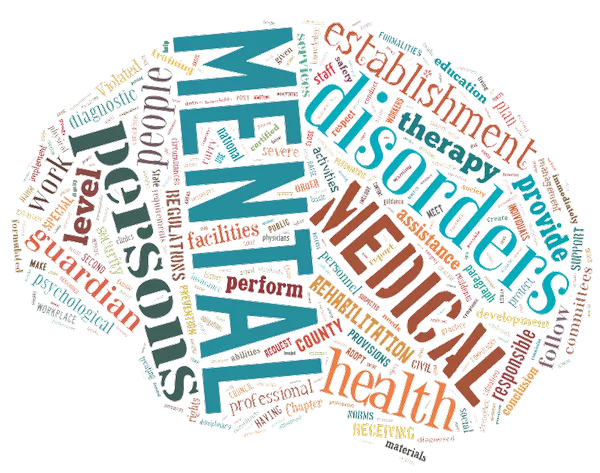Bipolar disorder, characterized by extreme mood swings between manic and depressive states, is a complex mental health condition that affects millions of individuals worldwide. Within the spectrum of bipolar disorder, psychosis represents a particularly challenging aspect, involving a detachment from reality. Understanding the triggers of bipolar psychosis is crucial for effective management and support for individuals navigating this intricate mental health landscape. In this in-depth exploration, we delve into the multifaceted factors that can potentially trigger bipolar psychosis and the implications for those living with this condition.
8 Causes of Bipolar Disorder
1. Bipolar Disorder and Psychosis:
Bipolar disorder, previously known as manic-depressive illness, encompasses distinct periods of elevated mood (mania) and depressive episodes. While not everyone with bipolar disorder experiences psychosis, it is a significant feature for some. Psychosis in bipolar disorder may involve hallucinations, delusions, and impaired cognitive functioning, posing challenges for both individuals and their support networks.
2. The Interplay of Genetics:
Genetic factors play a substantial role in the development of bipolar disorder and its associated features, including psychosis. Individuals with a family history of bipolar disorder or other mood disorders may be genetically predisposed to the condition. The specific genes involved in bipolar psychosis are still under investigation, but research suggests a hereditary component.
3. Neurochemical Imbalances:
Alterations in brain chemistry contribute to the manifestation of bipolar disorder and can potentially trigger psychosis. The intricate interplay of neurotransmitters, including dopamine and serotonin, plays a crucial role in regulating mood and cognition. Imbalances in these neurotransmitters are linked to the manic and depressive states characteristic of bipolar disorder, with disruptions possibly leading to psychotic symptoms.
4. Substance Abuse:
Substance abuse is a recognized risk factor for triggering bipolar psychosis. The use of certain substances, including stimulants like cocaine or amphetamines, can exacerbate manic symptoms and contribute to the onset of psychosis. Substance-induced psychosis can mimic the features of primary psychotic disorders, making it essential to address both substance abuse and the underlying bipolar disorder.
5. Sleep Disturbances:
Disruptions in sleep patterns, whether due to insomnia or irregular sleep schedules, can act as triggers for bipolar psychosis. Sleep plays a crucial role in mood regulation, and inadequate or disrupted sleep can contribute to mood instability and increased vulnerability to psychotic episodes. Establishing healthy sleep hygiene is an integral part of managing bipolar disorder.
6. Chronic Stress:
Stress is a known trigger for mood episodes in bipolar disorder, and chronic stressors can contribute to the emergence of psychosis. High levels of stress activate the body’s stress response, releasing hormones that can impact brain function. Chronic stress may also contribute to structural changes in the brain, potentially increasing the risk of psychosis in individuals with bipolar disorder.
7. Life Transitions and Major Events:
Life transitions, whether positive or negative, can act as triggers for bipolar psychosis. Significant life events such as childbirth, job changes, or the loss of a loved one can disrupt stability and contribute to mood fluctuations. The emotional intensity associated with major life events may escalate into psychotic features for individuals with bipolar disorder.
8. Medication Non-Adherence:
Consistent medication management is crucial for individuals with bipolar disorder to stabilize mood and prevent episodes of psychosis. Non-adherence to prescribed medications or abrupt discontinuation can lead to destabilization and increase the risk of psychotic symptoms. Regular communication with healthcare providers is essential to tailor medication plans to individual needs.
9. Co-occurring Medical Conditions:
Certain medical conditions can exacerbate the symptoms of bipolar disorder and contribute to the onset of psychosis. Neurological conditions, thyroid disorders, and autoimmune diseases are examples of medical conditions that may interact with bipolar disorder, complicating its course and triggering psychotic episodes.
10. Hormonal Changes:
Hormonal fluctuations, particularly in women, can influence the course of bipolar disorder and potentially trigger psychosis. For some women, hormonal changes during menstruation, pregnancy, or menopause may be associated with shifts in mood and an increased susceptibility to psychotic features. Hormonal therapies or adjustments may be considered as part of a comprehensive treatment approach.
11. Environmental Factors:
Environmental factors, including the individual’s surroundings and support system, can influence the course of bipolar disorder and contribute to psychosis triggers. A stable and supportive environment, coupled with access to mental health resources, can positively impact the management of bipolar disorder and reduce the likelihood of psychotic episodes.
12. Trauma and Childhood Adversity:
Experiences of trauma and childhood adversity are linked to an increased risk of developing bipolar disorder and may contribute to the triggering of psychosis. Traumatic events can have a lasting impact on the brain and may interact with genetic and environmental factors to shape the course of bipolar disorder.
See Also: Everything You Need to Know About Bipolar Disorder
Conclusion:
Bipolar psychosis is a complex manifestation within the spectrum of bipolar disorder, and its triggers are multifaceted. Understanding the interplay of genetic, neurochemical, environmental, and lifestyle factors is crucial for tailoring effective interventions and support for individuals with bipolar disorder. A comprehensive approach that addresses medication management, sleep hygiene, stress reduction, and the management of co-occurring conditions is essential for promoting stability and minimizing the risk of psychotic episodes. By unraveling the intricate web of triggers, healthcare professionals, individuals with bipolar disorder, and their support networks can collaborate to navigate the challenges posed by bipolar psychosis and work towards enhancing overall mental health and well-being.

